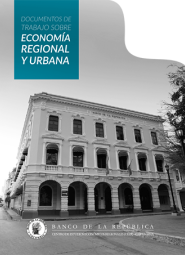The Great Depression in Colombia: A Stimulus to Industrialization, 1930-1953
La serie Borradores de Economía es una publicación de la Subgerencia de Estudios Económicos del Banco de la República. Los trabajos son de carácter provisional, las opiniones y posibles errores son responsabilidad exclusiva del autor y sus contenidos no comprometen al Banco de la República ni a su Junta Directiva.
This paper analyzes the role of the Great Depression and protectionism in the Colombian industrialization of the early 1930s as well as the role of other determinants in the rapid industrialization that took place during the period 1934-1953. We conclude that the market pushed industrialization by reducing costs, generating economies of scale, learning by doing, giving place to agglomeration economies, and rapid technological change. This paper also examines the structure of the Colombian manufacturing sector in 1945, which was the result of the deep socio-economic transformations that took place in the previous decade. The results indicate that the industrialization process was uneven across regions, and that it was spatially concentrated. Estimations of a production function for industry in 1945 show that there were important differences in factor elasticities and productivities among sectors and regions, which led to different regional patterns of industrialization. In addition, the results indicate that labor productivity in 1945 was positively and significantly related to education and capital, whereas it was negatively related to the unskilled workers and the age of the firms.
The series Borradores de Economía is published by the Economic Studies Department at the Banco de la República (Central Bank of Colombia). The works published are provisional, and their authors are fully responsible for the opinions expressed in them, as well as for possible mistakes. The opinions expressed herein are those of the authors and do not necessarily reflect the views of Banco de la República or its Board of Directors.





















































